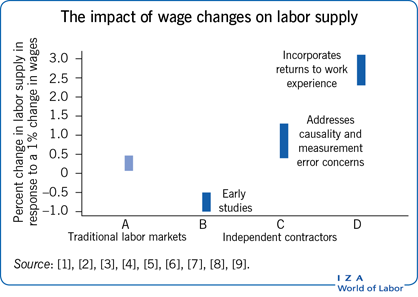Elevator pitch
A fundamental question in economic policy is how labor supply responds to changes in remuneration. The responsiveness of labor supply determines the size of the employment impact and efficiency loss of progressive income taxation. It also affects predictions about the impacts of policies ranging from fiscal responses to business cycles to government transfer programs. The characteristics of jobs held by independent contractors provide an opportunity to overcome problems faced by earlier studies and help answer this fundamental question.
Key findings
Pros
Studies of independent contractors’ labor supply offer advantages over studies that focus on more traditional labor markets, because earnings variation occurs on a daily basis and because workers have the autonomy to choose when to work.
Studies of independent contractors’ labor supply confirm a key prediction of standard economic theory: Workers with the flexibility to choose when to work choose to work more when earnings are temporarily high.
Although several studies document what appears to be “irrational” worker behavior, the majority of the evidence suggests that any irrational tendencies play a limited role in labor supply decisions.
Cons
Estimates of the response of labor supply to small and transitory variations in remuneration derived from more traditional labor markets may be erroneously small.
To correctly estimate labor supply responses, researchers must identify changes in labor supply that are caused by changes in earnings, and ensure that errors in measuring labor supply do not create a spurious negative relationship between observed earnings and labor supply.
When wages grow with work experience, relating wage variation with hours variation, as is done typically, will produce erroneously small estimates of the response of labor supply to transitory variations in remuneration.
